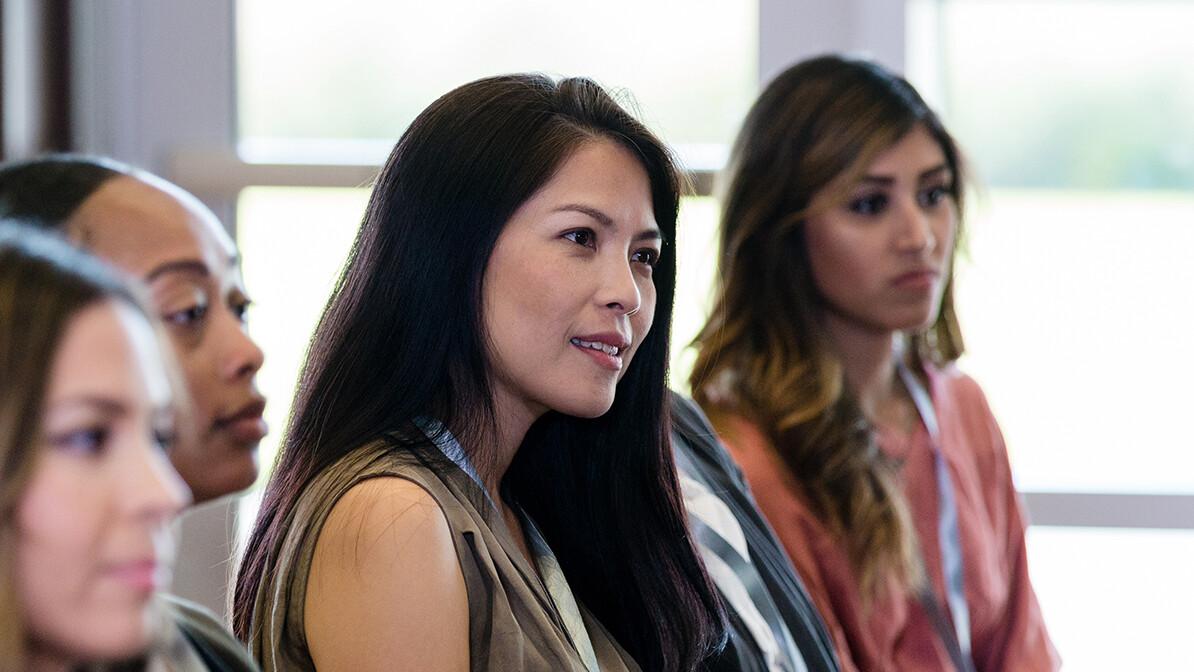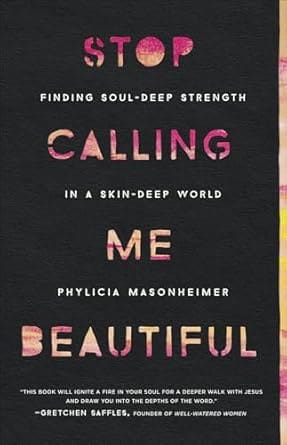- Home
- Spiritual Life
- Stop Calling Me Beautiful

Stop Calling Me Beautiful
 Excerpt taken from Stop Calling Me Beautiful: Finding Soul-Deep Strength in a Skin-Deep World by Phylicia Masonheimer
Excerpt taken from Stop Calling Me Beautiful: Finding Soul-Deep Strength in a Skin-Deep World by Phylicia Masonheimer
Chapter 1
Stop Calling Me Beautiful
“Are you ready to be encouraged, ladies?” The speaker sprang onto the stage with energy, her jewelry glittering in the stage lights. We shouted a collective “Yes!” from our seats as the speaker took her place at the pulpit. We’d already sung a few songs and played a game guessing what was inside someone’s purse, and now were ready to be filled up with the Word. Trendily dressed in skinny jeans and big earrings, we grasped our journaling Bibles and monogrammed notebooks. We were excited and anxious to be encouraged, to find a solution to our daily struggle in this Christian life.
The speaker started with some relatable problems: Our need to feel like enough. Our stress. Our dissatisfaction with life as it is. “Ladies, we need Jesus!” she declared. “We need to be encouraged by Him so we can be the best wives and mothers and women we can be.” We all got out our pens to take notes, ready to learn and grow. But as the message wore on between comedy segments, I heard nothing I hadn’t heard before: “You’re so beautiful.” “You’re so worthy of love. God will get you through this.” “You just need Jesus.”
The women nodded along with the message. I nodded along too. I knew I needed Jesus. The speaker was right about that. But as the evening ended and I shuffled out with the throng, Bible unopened under my arm, I wondered, Is it normal to want more than this?
Every year thousands of women gather together to listen to yet another speaker tell us who we are in Christ. These conferences, retreats, and conventions are well-intentioned. Some of them equip and educate women in the Word of God, or at least attempt to do so. Then the next year rolls around and we find ourselves once again seated at the women’s conference, learning once again that we’re “beautiful daughters of God.” Yet each year we return home to the same struggles and sins we had before the conference. The spiritual high of the speaker’s message fades. Something is missing.
At home, many of us face difficult marriages, lonely workplaces, unfriendly mirrors, and overwhelming motherhood. Insecurity and guilt take a backseat at a women’s conference, but here at home? They loom large. The Jesus whose presence was so tangible in a worship-filled sanctuary is now seemingly impossible to reach.
The problem of shallow Christian teaching pervades women’s conferences, retreats, ministries, and devotional books. We have heard the same message time and time again—a message meant to empower us to live better lives. Yet no matter how many times we hear it, change evades us. If this message is so powerful, why haven’t our lives, marriages, and experiences of motherhood changed for the better? Why does the Christian life still feel so heavy if Jesus promised His burden was light (Matthew 11:30)?
The Christian life is not a checklist, but many women treat their faith as if that’s exactly what it is. Their faith consists of virtues they are meant to achieve by sheer willpower and sufficient Bible reading. They attend church, listen to worship music, start Bible-reading plans, and try to pray. But when anxiety, stress, fear, anger, or temptation assault their hearts, these women are running on empty. The Christian life they’ve been sold is all effort and little reward. The best they can hope for is the next platitude from their morning devotional—“You’re a beautiful daughter of God!” However, the “you’re beautiful” message, though palatable and fun to present, isn’t the one women need to hear most.
Perhaps you’re tired of the struggle. You’re tired of the work. You’re just…tired. And being told you’re beautiful hasn’t made things any easier. What good is being a beautiful daughter of the King when your marriage is on the rocks, when grief is choking you, when work is unfulfilling, or when you hate what you see in the mirror?
Women face many difficulties in our daily lives, things we never expected and never wanted. This is life in a fallen world, and Christianity is supposed to have an answer for our struggles. But the answers we’ve been given aren’t helping us live more peaceful and victorious lives. We’re still down in the mud and the broken places, wondering how this could possibly be what Jesus meant when He said, “My yoke is easy and my burden is light” (Matthew 11:30).
An Incomplete Gospel
Gospel is a vague word for many people, conjuring images of Billy Graham rallies and the hymnbook in Grandma’s church. But the gospel is simply this: the whole story of Christ’s work to save us.
What we hear from the pages of a devotional or the stage at a women’s conference may feel right, but is it the stuff of freedom? We all want to know we’re desirable, but will being called beautiful give us lives of purpose and depth? Judging by the results so far, the answer to both these questions is no. Being told we’re beautiful in God’s eyes is a surface response to a soul-deep problem. That problem is our own sinfulness.
Sinfulness isn’t a word we like to attribute to ourselves. It’s uncomfortable and ugly. We’d much rather talk about God’s love for us—and that’s what many female writers and teachers do. But when we ignore the impact of sin on our own natures, we can’t comprehend the greatness of God’s love. In John 3:16, Jesus says, “God so loved the world that he gave his one and only Son.” God does love us—so much so that He sacrificed His Son. But when we focus only on the first half of this verse, we’re missing the entire point. God doesn’t love us because you and I deserved it. He loves us in spite of ourselves. We are so sinful, so unable to bridge the gap between ourselves and a holy God, that He sent His Son to die on our behalf.
As women, we long to know that we’re desired just for being us. We’d much rather God had come to earth simply because we’re beautiful to Him. But in order to grasp the fullness of God’s love and find true freedom, we have to get the story straight. Sin marred our original beauty. Sin destroyed what God meant us to be.
God is life, and as sinners, we are separated from Him. This is why the apostle Paul said, “The wages of sin is death” (Romans 6:23); death is the ultimate separation from God. Apart from Jesus, that’s just what will happen to us. Jesus’s sacrifice wasn’t just a nice plan to get us out of trouble. His punishment replaced ours! Because God so loved the world, Christ paid the debt we owed.
This is the gospel. This is the good news of Christ Jesus for those in need! But many female Christian leaders have parsed the gospel into “pleasant” and “not-so-pleasant” pieces. Consequently, we hear a lot about God loving us, calling us beautiful, and celebrating us as women, but not much about what had to happen for us to receive this extraordinary love.
The incomplete gospel of modern Christianity gives general solutions to very specific problems. Our struggle against sin manifests itself in specific ways: addiction, anger, fear, legalism, shame, and so much more. The problem for women today is the “good news” preached to women doesn’t have the necessary depth to free us. It’s not enough for Christian women, and we deserve more. We deserve to know the complete gospel and to understand how it frees us to live lives of both present and eternal impact.
The gospel is good news because it gives hope to the hopeless. It lifts us out of perpetual defeat and offers us a way home. A message divorced from the complete gospel, a message of love and beauty without Jesus’s sacrifice, can never bring lasting change. The gospel is the specific solution to our specific problem with sin, however it manifests in our lives.
The Defeat of Incompleteness
What does the gospel have to do with our daily life? Everything. The defeat we experience in relationships and in temptation happens because we don’t know how to rightly live out the gospel. And often we don’t live out the gospel because we haven’t heard it taught accurately. Many of us assume that if God loves us (a word we often define emotionally) and we love Him back on an emotional level, somehow we will live a life of eternal impact. This might satisfy us during an early-morning quiet time with coffee and a candle, but that kind of faith crumbles when we face conflict.
In crisis, we discover just how weak this gospel is. In the midst of a marital fight, a debilitating illness, or a sudden financial setback, knowing we are beautiful daughters of God falls rather flat. There has to be more to the gospel, the more that Jesus promised in John 10:10. And there is! The complete gospel—our sinfulness, God’s grace, Christ’s imputed beauty—empowers us with a strength the incomplete gospel cannot supply. Without the whole truth about who we are and what God does for us, we will never know the fullness of the life God intends for us.
So we need the full story, the whole gospel. The complete gospel enables us to live free from sin, shame, defeat, and stress. Yes, God loves us—but that love came with the highest of costs: Jesus’s death on the cross. Acknowledging our own sinfulness is the first step to realizing the magnitude of God’s love. When women recognize the lengths to which God went in order to bring them into His family, they are transformed. The bondage of besetting sins becomes surmountable. Chains of addiction are broken one by one. Challenges, fears, and difficulties that could not be conquered by an incomplete gospel are crushed by the power of complete truth.
Our God is a God of freedom. While we live in a fallen world, Christ has overcome the world (John 16:33). Every day that we walk by the Spirit of God, we have what we need to conquer weakness and sin. But it takes more than a feel-good message and an occasional prayer to get there.
Where the Message Went Wrong
The “beautiful daughter of God” message is not untrue. In Christ, we are indeed beautiful. We were also created in the image of God and are part of His kingdom work. These are beautiful truths. But the beauty of God’s people is not the point of the gospel. The goal of the gospel is to unite us in relationship with our holy, loving God, and to invite others to have that relationship through our witness in this world.
Though it’s comfortable and pleasing to hear positive and encouraging things about ourselves, that’s not what women of God need most. Shallow Christian messages try to affirm who we are in Christ without discussing the consequences of sin. But sin is the problem. We need the external solution to our internal sinfulness: We need Jesus Christ. We need to hear less about us, and more about Him.
Hearing Jesus preached, not to learn more about ourselves or to become better people, but simply to learn more about Him, is not all that appealing to us. We want to know we’re desirable, so messages about desirability strike a chord in our hearts. But if we want to be truly free, we have to recognize the flaws in these narratives and open ourselves up to something deeper, something far more lasting than beauty and desirability.
There are three primary problems with the messages of many female Christian influencers. By recognizing these three problems, we can learn to see past surface-level gospel messages and seek the truth that changes lives.
The Message Is Theologically Deficient
The first problem is that Christian women are being taught a message that is theologically deficient. Theology has a simple definition: the study of God. Early church father Augustine defined it as “an account or explanation of the divine nature.” All of us have a theology. Our theological viewpoint is the framework for our understanding of God. Everything you’ve read, heard, and believed about Jesus and the Bible helped shape your understanding of who God is and how He works in your life. This is your theological viewpoint.
Modern women’s ministry’s framework for presenting and understanding God contains pieces of truth, but these pieces do not present an accurate picture of God and the gospel. Women walk away with a Christianity that is all verses and flowery feelings and has no power for daily life.
We’ve been sold a message of all comfort and no strength, and because of this, many of us find following Christ joyless, hard, and empty. We can’t conquer insecurity, shame, and feeling overwhelmed because all we know about God are proof-texted verses about His love and kindness. We don’t know how to walk by the Spirit. We don’t know the why and how of our salvation and how it works out in the hard hours of our days. These surface-level messages to women, though well-intentioned, are keeping us from a true knowledge of God and in bondage to the very things from which we want to be free.
The Message Is Self-Focused
Second, the message we’re hearing is self-focused. Flawed theology always turns attention away from God and onto ourselves, and that’s exactly what has happened with women’s ministry today. The messages preached to us almost inevitably focus on…us. While it might seem logical that if we focus on ourselves more, we’ll change ourselves for the better, that’s not how discipleship works. Turning our eyes to Jesus is how we are transformed. Change comes by His power, not ours.
Self-focus is why so many Christian women are exhausted by the Christian life. Our attention is constantly being turned away from the One who could bring us real change. Instead, all our efforts are turned toward ourselves: our identities, our desirability, our inadequacy, and our work to be good Christian women. No wonder we’re tired! This is not what God wanted for His daughters.
The Message Is Superficial
Finally, the modern messages preached to women through books and media lack depth. In an effort to provide relevant, relatable content to Christian women, we’ve watered down the gospel. The resulting content leaves women grasping for something more. Modern American expressions of Christianity, especially among women, are focused on the emotional, rather than intellectual, aspects of faith. With their limited knowledge of Scripture, Christian women are left ill-equipped to defend what they believe in the public sphere and are even less equipped to face testing.
Theological education—learning about God, the Bible, and how these truths apply to life—is not just for men or for those called to ministry. Women must be spiritually equipped with the knowledge of God through His Word so they can minister to the people around them. This requires participating in a depth of study to which many women aren’t accustomed. Such education requires more spiritually mature women to disciple their weaker sisters. We must recognize that cute Instagram quotes, isolated Bible verses, and 15-minute quiet times are not the sum of the Christian life, but that we are called to a deep, consistent relationship with God and to teach that relationship to the people around us.
God’s Word contains all we need to know about the Christian life, and we need to go deeper in our understanding of it. But we also need to know how to live it out. How many of us don’t know what taking captive our thoughts (2 Corinthians 10:5) really means? How many of us don’t know how to set our minds on the Spirit (Romans 8:6)? How many of us don’t know how to walk in a manner worthy of our calling (Ephesians 4:1)? Ultimately, many of us don’t know how our faith applies to marriage, motherhood, dating, or work. The missing piece of the conversation is the work of the Holy Spirit in the believer’s life.
The Holy Spirit can make for a controversial topic. Large populations of Christians associate the Holy Spirit with charismatic churches, so many pastors and teachers avoid discussing the role of the third person of the Trinity. As a result, women do not know how the Spirit empowers them to overcome daily struggles.
Think for a moment. When was the last time you attended a women’s conference where the Holy Spirit was really talked about? What was the last book you read that taught you how the Spirit changes your relationships and helps you overcome sin? By avoiding controversy, conflict, and discussion of the Spirit’s role, modern women’s ministry remains on the surface of Christian teaching. This may be the safe way to teach, but it does not create thriving disciples. The beauty-centric gospel is responsible for creating a generation of female Christians who know little about what they believe or how those beliefs should play out on a daily basis.
The Message We Need
A few weeks ago I attempted the Whole30 meal plan. I’d done it before—30 days without sugar, dairy, legumes, or processed food—but for some reason, this time was even more of a struggle. I made it for two weeks before we went out of town on a trip, during which I went completely off the plan. Donuts, here I come! Upon returning home, I found myself craving the foods that previously seemed so limiting. Having experienced the vibrancy of life without sugar, all I wanted was veggies and fruits.
Just as my body craved healthy food instead of sugary snacks, Christian women crave spiritual depth. They don’t just need more from the church—they want more. Within every woman is both the ability and the desire to find a deeper spiritual life. Many women simply don’t know where to start. We’re told that Christ provides purpose, yet we live as if He doesn’t. We’re taught a Christianity based on effort, not gospel grace, and we are exhausted. We need a complete gospel message that includes who we are apart from God, reverence for God Himself, and how God enables us to overcome in daily life. But where to begin? Where do we find this message, and how do we live it out?
Within each woman of God dwells the Spirit of God, who grants us wisdom to comprehend who He is (John 14:26), but we don’t know how to access that wisdom. We have the capacity to be curious about spiritual things. But surface-level messages kill such a curiosity. In a sense, many Christian influencers talk down to us instead of speaking to the capability of the Spirit within us. These messages are just enough to keep us going in our spiritual walk, but not enough to aid deeper growth.
The true gospel is available to all of us through God’s Word. We must learn to study it. We must know it well enough to rightly divide the truth and check teachings against the Word of God as the Bereans did (Acts 17:11). In other words, we must cultivate a holy curiosity.
Holy means set apart, sacred, and dedicated to God. Curiosity is a strong desire to know and learn. A holy curiosity, then, refers to a mind that strongly desires to know and learn about God. A mind like this doesn’t happen by accident. It is cultivated day by day. The Holy Spirit grows and nurtures this desire as we faithfully expose ourselves to Him through Scripture, godly community, and solid teaching (all of which we’ll address later in this book).
Women who love God and cultivate this holy curiosity aren’t satisfied with shallow teaching. By rejecting this imitation spirituality and seeking God’s intentions for our walk with Him, we grow into a robust faith, a faith able to weather even the most difficult or mundane of circumstances: the death of a parent, the betrayal of a friend, the pain of infertility, the fear of financial ruin, the difficulty of long-term singleness.
Are you done living on the surface? Are you ready to dive deeper in your faith, your understanding of God, and your walk by the Spirit? Are you hungry for more and better in your spiritual life? If so, keep reading.
…
Order your copy of Stop Calling Me Beautiful: Finding Soul-Deep Strength in a Skin-Deep World
Trending Now
Sign up today for your Inspiration Today Daily Newsletter
Supercharge your faith and ignite your spirit. Find hope in God’s word. Receive your Inspiration Today newsletter now!
Phylicia Masonheimer
Phylicia Masonheimer teaches Christian women how to apply faith to the realities of life. She is a blogger, podcast host, and speaker. Her writing focuses on overcoming sin and difficulty by the power of a maturing personal relationship with God. Phylicia lives in northern Michigan with her husband and children. Learn more at phyliciamasonheimer.com
Related Articles
February 27, 2026
Friendship with Jesus: Finding Joy in the Creator
True joy begins when we know Jesus not only as Savior, but as Creator—and learn to walk with Him in…
February 25, 2026
Finish Strong with a Kingdom Mindset
For if you keep silent at this time, relief and deliverance will rise for the Jews from another…
February 23, 2026
The Joy of Being His Workmanship
When life urges us to strive harder and do more, Scripture invites us to rest in a freeing truth:…
February 20, 2026
Stepping Out in Faith When God Calls You to the Impossible
Stepping out in faith often feels uncomfortable—especially when God calls you toward something that…
Next Steps To Strengthen Your Walk
Inspiration Today Newsletter
Supercharge your faith and ignite your spirit. Find hope in God’s word. Receive your Inspiration Today newsletter now!
Christian Articles
Find articles to strengthen your walk and grow your faith. We have a wide range of topics and authors for you.
Submit A Prayer Request
We are here for you. Simply click on the button below to reach us by form, email or phone. Together we will lift our hearts and voices with you in prayer.





